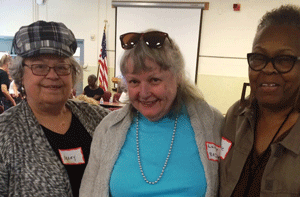
"We need to learn how to ask the question.
Trust your gut.
Assume you're the only one who is going to reach out.
Just ASK."
Dr. Lisa Horowitz, National Institute of Mental Health
Suicide is the leading cause of death for youth ages 15-24 in the U.S., about 15 youth suicides occur in our country every day. Our own community has suffered as well.
On April 27, 2017, dozens of concerned clinicians, parents, teachers, counselors and survivors gathered in a small former elementary school cafeteria in Fairfax County for a community conversation about preventing youth suicides. They learned that there is a role for everyone in suicide prevention, and ways we can all help prevent such tragic deaths.

The keynote speaker was Dr. Lisa Horowitz, Ph.D., MPH, a specialist in pediatric psychology with the National Institute of Mental Health who focuses on suicide prevention. She described several evidence-based tools for detecting depression and suicidal outcomes among youth, including "ASQ," a brief screening tool she helped create. Used in medical settings, ASQ provides clear "next steps" and resources for patients.
Throughout her presentation, Dr. Horowitz stressed that everyone can help prevent youth suicide. "Teens get sad, they need someone to talk to," she said. "Sometimes they feel no one cares, and they don't want to talk to mom or dad about their feelings." She stressed the importance of asking the direct question: "Are you considering suicide?"
Following Dr. Horowitz's presentation, CSB Executive Director Tisha Deeghan led a panel discussion about youth suicide prevention efforts, youth mental wellness and other local behavioral health initiatives in Fairfax County.
Panelists included:
- Gloria Addo-Ayensu, MD, MPH, Director, Fairfax County Health Department
- Lyn Tomlinson, Assistant Deputy Director, Fairfax-Falls Church Community Services Board
- Dede Bailer, Ph.D., Coordinator, Psychology Services, Fairfax County Public Schools
- Jesse Ellis, Prevention Manager, Fairfax County Department of Neighborhood & Community Services
- Betty Petersilia, LCSW, Manager, Children's Behavioral Health Systems of Care
Ms. Petersilia urged attendees to "be present and be ready to listen" to young people in their lives. She described the Children's Behavioral Health Systems of Care initiative in Fairfax County, which engages families, schools, CSB staff and volunteers from NAMI - Northern Virginia (National Alliance on Mental Illness) in helping to eliminate barriers that prevent people from seeking help. She described the county's new, short-term behavioral health initiative that enables students in 13 schools to seek mental health support for up to eight sessions through a network of contracted service providers.
Dr. Bailer described the operationalization of mental health services and systems of support in Fairfax County Public Schools. She also emphasized the importance of simple, everyday actions that can make a big difference: "Calling a student by name, saying hello, taking time for a conversation…we can all help build confident, stronger students, if we try," she said.
Mr. Ellis urged the entire community – including churches, businesses, doctors, and families – to get involved. He stressed the importance of relationships among teens and helpful adults and of having places and people teens can turn to when they need help. "We need to work together to create personal and family strategies and make concrete efforts," he said.
Ms. Tomlinson pointed out that CSB emergency mental health resources are available 24/7 for residents of Fairfax County and the cities of Fairfax and Falls Church. She described some of the many tools CSB provides to the community including free, online suicide prevention training, Mental Health First Aid classes, walk-in access to screening and assessment for youth and adults, and the 24/7 crisis hotline and text line that CSB provides through a contract with PRS Crisis Link. "We need to make it OK to talk about suicide, drug use disorders, and mental and emotional health," she said.
Dr. Addo-Ayensu observed: "Too many suffer in silence due to fear of stigma. We must encourage people to take advantage of the treatment and choices that are available here in our county and region."
Another speaker, Roan Harris, a local businessman and teacher for the "Man Up" program in Gum Springs, described his experiences with youth engagement and shared his ideas on how to help support teens.
"Our community needs to work hard to be conscious of what we say and do, and how we treat others," Harris said. "Our children watch us. We need to look at our ideas and skill-building tools for roles of strong men and women, to get rid of negative labels and stigmatization."
CSB Executive Director Deeghan concluded the forum with this observation: "If enough people can recognize signs of mental health concern and know how to link others to help, lives can be saved. We use our obstacles as stepping stones; this is a room with hope."
The forum was a joint outreach collaborative of the CSB and NEXUS, a committee of an advisory board serving the CSB's Gartlan Center. NEXUS forums have been designed to engage the community on important topics associated with mental health, substance use disorders and developmental disabilities. The forums are held annually and emphasize resilience, recovery and wellness.
In addition to CSB, resource exhibitors included the Inova-Kellar Center, the Suicide Prevention Alliance of Northern Virginia and the National Capital Area Chapter of the American Suicide Prevention Association.
Contact for news media inquiries: CSB Communications Team, 703-324-7000.

